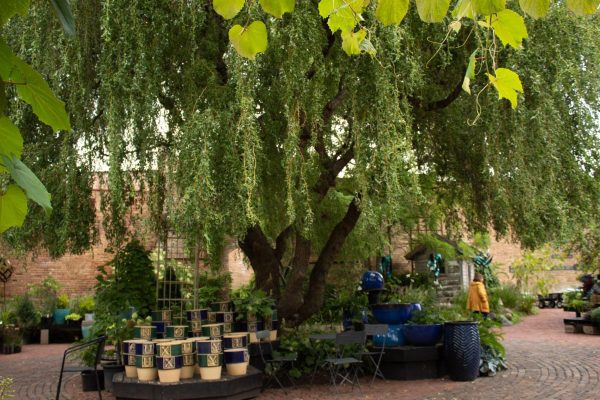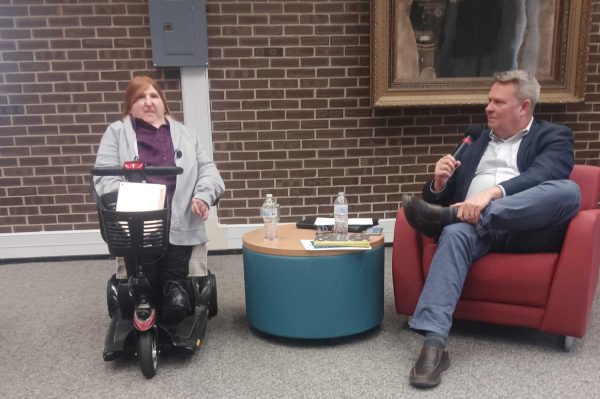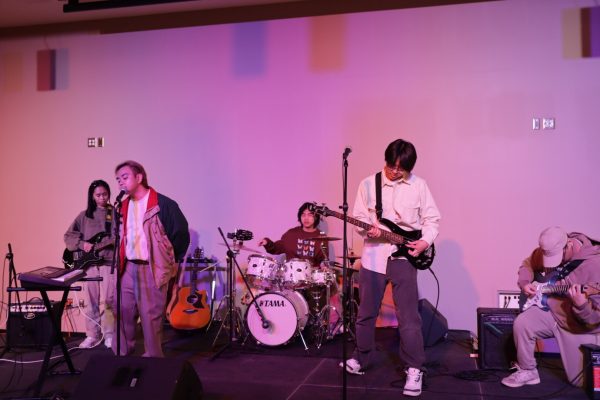World-class musician visits DeKalb
November 10, 2005
NIU’s guest recitalist, veteran world music composer, performer and conductor, was introduced by friend and NIU jazz professor, Fareed Haque, as “the incredible, unstoppable, unbeatable, David Amram.”
Amram, who has persevered for more than half a century in the professional symphony circuit, was an integral member of what now is known as the late ’50s “Beat” movement and has the good grace to be able to list American literary-giant Jack Kerouac as one of his dearest friends.
A world music aficionado in the truest sense of the word, Amram attacked the aural senses of his audiences Monday and Tuesday night with spoken word – scat, poetry, prose, improv – and music such as folkloric, classical, Afro/Cuban, Irish and jazz.
The original 1962 “Manchurian Candidate,” score written and conducted by Amram, was screened to a small, devout audience Monday. This was followed by an in-depth dissertation and question and answer concerning his musical manifesto, “purity of intent” and “exquisite choice of notes” and how his world music roots made the inspired score possible.
Haque, Amram and others then went to The House Café, 263 E. Lincoln Highway, owned by Haque, to catch the back end of the “Poetry Slam.”
The poetry reading was concluded by Amram giving an impromptu speech about himself, Kerouac and the “Beats,” a name and category Amram railed against every time the word came to pass.
“We were just people who came together to inspire and be inspired by each other; it was only later that kids would go and buy all-black clothing and walk into depressing poetry readings with their bongos, still with the price tag on the side,” Amram said.
Amram took to the piano, one of the instruments under his control, and initiated a performance of beat-classic “Pull my Daisy” with a near five-minute improvised rhyme, “ode to poetry” and played the folksy, jazz song with lyrics by Kerouac, Allen Ginsberg and Neal Cassady.
The consensus among the energized poets at The House Café was DeKalb poetry slam history was being made, and Amram’s praise of the local poetry reading tradition left the room buzzing hours after he left the stage.
At 11 a.m., Amram spoke to students at an all-school lecture in preparation for his 6:30 p.m. guest recital in the spacious concert hall.
“You have to take him with an open mind, he seems like a goofy guy, kind of in the moment,” Haque said. “But if you listen to his serious orchestra pieces, you can hear there’s a very serious undercurrent.”
The concert, “From Cairo to Kerouac,” took listeners first through ’50s America with works by Thelonious Monk and Amram performed in an informal jazz jam session and recitations from his book, “Offbeat: Collaborations with Kerouac” and Kerouac’s “On the Road” and “Dharma Bums.”
Five flutes, one djembe and many Indian-inspired scales later, the concert began to focus on Amram’s critically-acclaimed orchestral pieces, which have been played in concert halls around the world. It included Native-American inspired tunes performed by Amram, Afro/Cuban/Irish jam sessions and a concerto for cello and piano by NIU faculty members Bill Koehler and Marc Johnson.
The concert brought together the growlingly popular ethnic themes with European music’s accessible sensibilities.
“The concert ran like a cultural variety show: rants, readings, jazz music, classical music and philosophy,” said Madeline Fairbanks, a sophomore fine arts major.
The last two days of culture can be attributed to the social tendencies of Haque and his ability to make friends and bring around some of the larger names in the professional music field.
“We met when I was in the Brooklyn Philharmonic, and David was the conductor,” Haque said. “We both loved jazz, world and classical music, which in those classical circles wasn’t very common. We had the same agenda.”
Haque has brought many important musicians to DeKalb either to perform at The House Café or give guest recitals NIU would not have been able to acquire alone.
The “Deranged French Hornist,” a nickname given to Amram by Kerouac, was a gift to all the students who took the opportunity to see a world-renowned cultural figure brought to a town that’s not likely to see such musical royalty very often.










